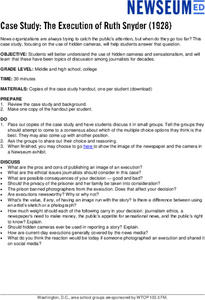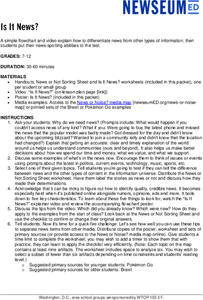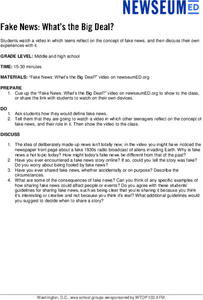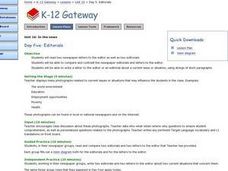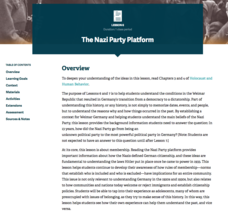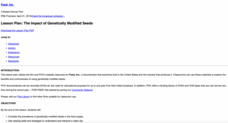Newseum
Case Study: The Execution of Ruth Snyder (1928)
The case of the 1928 execution of Ruth Snyder takes center stage in a lesson that asks young journalists to consider the ethics involved in publishing an image of an execution. A series of discussion questions ask individuals how they...
PBS
Decoding Media Bias
Alternative facts? After watching the We The Voters film, "MediOcracy," viewers compare how cable news outlets CNN, Fox News, and MSNBC report the same story about politics or public policy. After a whole-class discussion of their...
iCivics
Lesson 3: Bias
How do journalists balance bias and ethical reporting? The final lesson in a series of five from iCivics examines the different types of bias and how they affect the news we read. Young reporters take to the Internet to find examples of...
Newseum
Reporting Part III: Staying Objective
The third and final activity in the Reporting series tests young journalists' ability to be objective in reporting contentious topics. After brainstorming a list of contentious topics that interest them, the class selects one, and...
Newseum
Is It News?
Is it news or not? That is the question young journalists must consider in a lesson about newsworthiness. Class members watch a short video that details five key characteristics of quality, credible news. Individuals then use these tips...
Facebook
Versions of Media Texts
Verification of provenance and the original source of an image or video can be a long and winding process. Young journalists learn about the difficulty of finding the original source of a scrape, a copy of an original news story, and...
Facebook
Metadata
In previous lessons, young journalists learned about how to trace the original source of scrapes and memes. This interactive lesson plan teaches them another important step in the verification process. Participants learn how to analyze...
Newseum
You Can’t Say That: Right to Know vs. Security Risk
Print or block? That is the question young journalists debate as part of their study of the freedom of the press. Half the class represents the journalists' legal team, and the other half represents the government's legal team. Teams...
Curated OER
That Is Not My Opinion!
Being an informed citizen requires distinguishing fact from opinion and understanding persuasion methods. Secondary learners evaluate newspaper editorials. They read opinion pieces, identify the writer's purpose and position on an issue,...
Curated OER
Reduce, Reuse, Recycle
Students brainstorm and share opinions about products that can be reused or recycled after reading the article, "Seattle's Recycling Success Is Being Measured in Scraps." They then investigate, analyze and evaluate articles on recycling...
Newseum
Fake News — What's the Big Deal?
In a time of fake news and alternative facts, young people must have the ability to identify it and its role. Scholars watch a video of teens reflecting on the concept of fake news and the impact of sharing fake news stories. They then...
Facing History and Ourselves
Free Press Makes Democracy Work
A unit study of the importance of a free press in a democracy begins with class members listening to a podcast featuring two journalists, one from a United States public radio station and one from Capetown, South Africa. The lesson plan,...
Curated OER
The Brooklyn Museum of Art Newspaper
By working cooperatively, writers will create a newspaper about the Brooklyn Museum of Art. Each member will take on a different role representing various types of newspaper writers. They will discover the history, exhibits, special...
Curated OER
Legally Wed
Students explore the controversial topic of same-sex marriages in a fishbowl discussion. They write balanced news articles based on interviews exploring people's opinions on laws that define marriage.
Curated OER
Ancient History Cyber-Journalists
Students explore the ancient past. In this ancient civilizations lesson, students research ancient events and write newspaper articles about the events. Students work in teams of 4 to produce group newspapers that feature their findings....
Curated OER
Editorials
Students investigate editorials. In this literacy critical thinking instructional activity, students compare and contrast two newspaper editorials and two letters to the editor by completing a Venn diagram. Students work in groups to...
iCivics
NewsFeed Defenders Extension Pack
Accuracy, transparency, trustworthiness, and impartiality are four unspoken rules of journalism. Scholars delve deep into the subject by discussing the pros and cons of relying on social media for news. They also play an online game to...
Curated OER
Blog Your Truth
Students explore communication by participating in a digital journalism activity. In this aboriginal research lesson, students view a sample blog on the Internet and identify the techniques behind blogging and Internet journalism...
Curated OER
Appalachia
Learners investigate the benefits of dance and participate in dances. In this dance lesson, students investigate a number of dances such as square dancing and clogging that are native to Appalachia. They use math concepts to determine...
Curated OER
How Communication Technologies Affect People
Third graders complete a worksheet, first with known information, and then with researched information. They create a PowerPoint, video, or radio broadcast to convey the results of their research. They learn to use a graphic organizer to...
Curated OER
How Safe is that Fresh Autumn Cider?
Corn stalks and pumpkins, caramel apples and cider, falling leaves and brisk nights. There are a few of autumn's favorite things. But how safe is that unpasteurized cider bought at the roadside stand? Young researchers investigate the...
Facing History and Ourselves
The Nazi Party Platform
Not all party platforms stay democratic. A resource covers many political issues in Germany during the time of World War II, and teaches pupils about the Nazi party platform and what went wrong. Individuals participate in a warm-up...
PBS
The Impact of Genetically Modified Seeds
What is all the fuss about genetically modified foods? PBS provides this resource designed to supplement the documentary Food, Inc. to help learners investigate the benefits and controversies of genetically modified foods for individuals...
Curated OER
Chinese Newspapers
Students investigate the role of Chinese newspapers in the Australian Chinese community, both in the early 20th century and today. They identify the role of ethnic newspapers.


